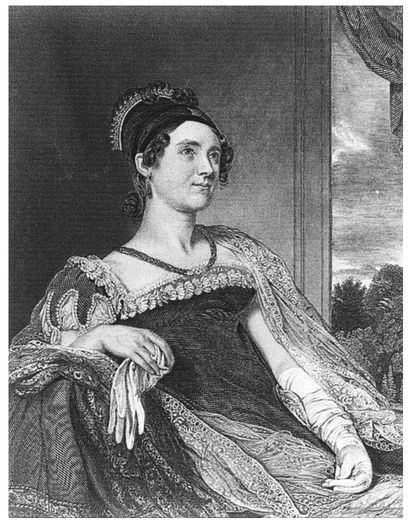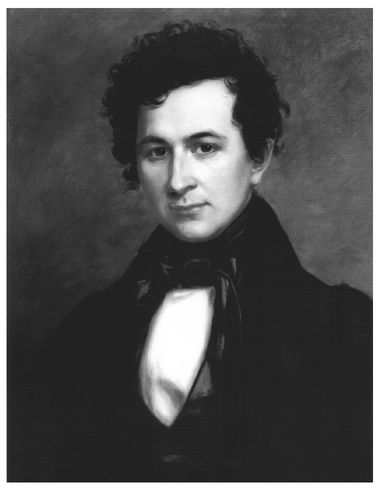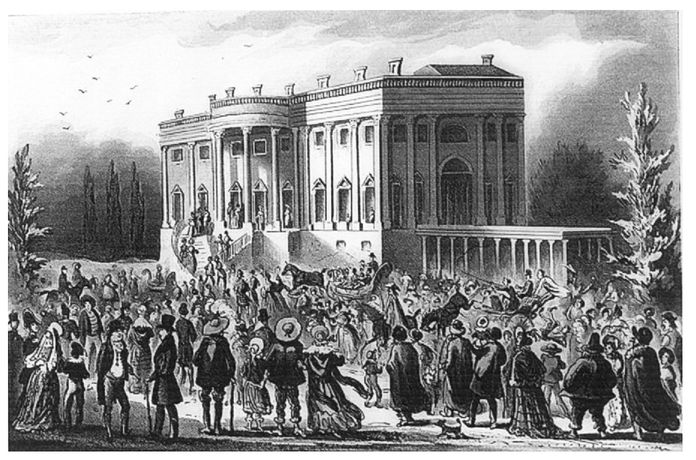John Quincy Adams (36 page)
Authors: Harlow Unger
The President managed to strip and swim ashore, where his son John II pulled him from the water, while Antoine scampered out and dressed as best he could, before running to the Adams house across the bridge to get a carriage. “While Antoine was gone,” the President confided to his diary, “John and I were wading and swimming up and down on the other shore, or sitting naked basking on the bank at the margin of the river. . . . The carriage came and took me and Antoine home, half dressed.”
18
18
Although he escaped injury, the President did not escape a torrent of ridicule, and later in the year, in October, the Tennessee legislature heaped insult on top of ridicule by nominating Jackson for the presidencyâthree years in advance of the next presidential race in 1828. Jackson immediately resigned his Senate seat to begin a national campaign to unseat John Quincy Adamsâsooner or later.
Rather than reinforcing his presidency, John Quincy seemed to go out of his way to undermine it. Apparently unaware of or unable to address the needs of a semiliterate rural population in his speeches, he always appeared
to address Harvard scholars or their ilk, insisting that “the great object of civil government is the improvement of the condition of those who are parties to the social compact.”
to address Harvard scholars or their ilk, insisting that “the great object of civil government is the improvement of the condition of those who are parties to the social compact.”
Roads and canals . . . are among the most important means of improvement. But moral, political and intellectual improvement are duties assigned by the Author of our existence. . . . Among the first . . . instruments for the improvement of the condition of men is knowledge, and to the acquisition of much of the knowledge adapted to the wants, the comforts and enjoyments of human life, public institutions and seminaries of learning are essential.
19
19
In what he consideredâand what really wasâa brilliant, forward-looking address to advance the nation, he called on Congress to promote “the improvement of agriculture, commerce and manufactures, the cultivation and encouragement of the mechanic and of the elegant arts, the advancement of literature, and the progress of the sciences.” Among the sciences, he cited astronomy as the most important and called for federal construction of astronomical observatories, or “lighthouses of the sky,” to study the heavens. He warned that failure to do so “would be treachery to the most sacred of trusts.” If any congressmen still supported his program at that point, he proceeded to lose them all with one of the most politically inept statements of his career: “While foreign nations . . . are advancing with gigantic strides in . . . public improvement, were we to slumber in indolence . . . and proclaim to the world that we are palsied by the will of our constituents, would it not be to . . . doom ourselves to perpetual inferiority?”
20
20
Even his most loyal supporters misunderstood the phrase “palsied by the will of our constituents.” North Carolina congressman Nathaniel Macon charged that “the message of the President seems to claim all the power to the federal government.”
21
And General Edmund Gaines, whom former President Monroe had sent to rid Amelia Island of pirates, predicted that
“the planters, farmers and mechanics of the country” would see the next presidential election as “a great contest between the aristocracy and democracy of America.”
22
21
And General Edmund Gaines, whom former President Monroe had sent to rid Amelia Island of pirates, predicted that
“the planters, farmers and mechanics of the country” would see the next presidential election as “a great contest between the aristocracy and democracy of America.”
22
Jackson thundered a reply that devastated John Quincy, who seemed unaware of the implications of what he had written and said. “When I view . . . the declaration that it would be criminal for the agents of our government to be palsied by the will of their constituents, I shudder for the consequence. . . . The voice of the people . . . must be heard. Instead of building lighthouses in the skies, establishing national universities, and making explorations round the globe . . . pay the national debt . . . then apportion the surplus revenue amongst the several states . . . leaving the superintendence of education to the states.”
23
23
While newspapers ridiculed John Quincy's “lighthouses in the skies,” Jackson addressed the needs and concerns of ordinary people. He called for an end to debtors' prisons, citing a blind man in a Massachusetts prison for a debt of $6 and a Rhode Island woman behind bars for a debt of sixty-eight cents. There were five times as many debtors as criminals in prisons, most of them indigent, with debts of less than $50, and forced to pay for their food in jailâor starve.
u
Jackson also called for reform of bankruptcy laws to prevent employers from declaring bankruptcy to avoid paying wages.
u
Jackson also called for reform of bankruptcy laws to prevent employers from declaring bankruptcy to avoid paying wages.
Although many of his proposals were two centuries ahead of their time, John Quincy was out of touch with his America. In what was clearly a clash of culturesâindeed, a clash of generationsâJohn Quincy saw man in general, and the American man in particular, as having unlimited talents, restrained only by lack of educational opportunities that he believed the federal government could and should provide. In fact, Americans were largely a society of small landowners and laborers, tilling the soil, accepting their lot as all but predestined, and largely intent on meeting their physical rather than any perceived intellectual needs. The average American man yearned not to attend school or college but to own a plot of
landâto work its soil, to plant and harvest enough to feed himself and his family, and to sell any surplus at market. John Quincy's proposals were so alien to American thinking of his time that his programsâalong with his presidencyâmet with nothing but ridicule and rejection, his chance for leadership spent, his dream of advancing the nation, culturally and economically, shattered.
landâto work its soil, to plant and harvest enough to feed himself and his family, and to sell any surplus at market. John Quincy's proposals were so alien to American thinking of his time that his programsâalong with his presidencyâmet with nothing but ridicule and rejection, his chance for leadership spent, his dream of advancing the nation, culturally and economically, shattered.
Depressed, he moped about the White House, lost weight noticeably, and reduced his presidential routine to early-morning Bible reading, a daily walk or swim in the Potomac, dinner with Louisa and the family, then an evening chat or a game of billiards. In the course of the day, he kept up with newspapers, signed letters, and received occasional visitors, but grew so moody he stopped writing in his diary, unable to understand why and how he had failed to make his countrymen understand what he was trying to do for them and the nation. His depression made Louisa's life miserable.
“There is something in this great, unsocial house which depresses my spirits beyond expression,” she complained in her diary. Evidently weary of the burdens of married life, she grumbled that a husband expected his wife to “cook dinner, wash his clothes, gratify his sexual appetites,” and then “thank him and love him for permission to drudge through life at the mercy of his caprices.”
24
She and her husband grew strangely distant, and when he traveled to Quincy for his usual summer vacation, Louisa went off on her own, up the Hudson Valley and then to New Hampshire. Their estrangement would last for the rest of their stay in the White House, although she appeared at family dinners and public entertainments.
24
She and her husband grew strangely distant, and when he traveled to Quincy for his usual summer vacation, Louisa went off on her own, up the Hudson Valley and then to New Hampshire. Their estrangement would last for the rest of their stay in the White House, although she appeared at family dinners and public entertainments.
The mood of the country worsened as well. Planters, farmers, craftsmen, and frontiersmen who made up the majority of Americans were independent and self-sufficientâunwilling to brook interference in their lives by a far-off federal government. They developed a deep resentment for the Harvard scholar who suggested he knew better than they what they needed to know and what they needed to do. They wanted less government, not more. They would read and learn what they likedâor not. They would build their own roads if they thought they needed any and grow and hunt what they pleased when they pleased.
Â
English-born First Lady Louisa Catherine Adams despised life in the White House, saying, “There is something in this great, unsocial house which depresses my spirits beyond expression.”
(LIBRARY OF CONGRESS)
(LIBRARY OF CONGRESS)

Sensing the outrage of ordinary voters, Congress blocked every Adams proposal and brought federal government to a halt. And still clinging to his belief that the public would recognize merit, John Quincy refused to campaign for his programs, refused to answer critics, refused to explain his vision in terms the public could understand. In short, he refused to lead or fight backâeven after journalist Russell Jarvis of the
Daily Telegraph
assaulted his son John II in the rotunda of the Capitol.
Daily Telegraph
assaulted his son John II in the rotunda of the Capitol.
Jarvis had attended a White House reception after publishing a vicious attack on the President, and young Adams proclaimed in a loud voice that Jarvis should have shown the propriety not to show his face at the President's home. Jarvis sent John II a letter challenging him to a duel, and when
John II ignored it, Jarvis waited in the Capitol rotunda for the young man to arrive with messages from the President for Congress. He went up to John II, pulled his nose, then slapped his faceâthe standard, public provocation to duel. Unskilled with swords or pistols, John II faced certain death if he accepted the challenge. He wisely walked away, and John Quincy responded with a letter of protest to the Speaker of the House that his son had been “waylaid and assaulted.” He demanded a congressional inquiry.
John II ignored it, Jarvis waited in the Capitol rotunda for the young man to arrive with messages from the President for Congress. He went up to John II, pulled his nose, then slapped his faceâthe standard, public provocation to duel. Unskilled with swords or pistols, John II faced certain death if he accepted the challenge. He wisely walked away, and John Quincy responded with a letter of protest to the Speaker of the House that his son had been “waylaid and assaulted.” He demanded a congressional inquiry.
Â
The second-born son of John Quincy and Louisa Adams, thirty-one-year-old John Adams II.
(NATIONAL PARKS SERVICE, ADAMS NATIONAL HISTORICAL PARK)
(NATIONAL PARKS SERVICE, ADAMS NATIONAL HISTORICAL PARK)

“Assault Within the Capitol,” ran the headline of a pro-Adams newspaper, while Jarvis's
Telegraph
called “the pulling of the Prince's nose . . . a signal chastisement . . . of the Royal puppy.” Congress held hearings, questioned both Jarvis and John II, and did nothing. The President never said another word.
Telegraph
called “the pulling of the Prince's nose . . . a signal chastisement . . . of the Royal puppy.” Congress held hearings, questioned both Jarvis and John II, and did nothing. The President never said another word.
Politically impotent, John Quincy recognized that he would be the first chief executive in the nation's short history to contribute nothing to his country. With little else to do, he joined Louisa in breeding silkworms outside his office and lengthened the time he spent walking, swimming, and horseback riding each day.
The political misery that Jacksonians inflicted on John Quincy hurt Louisa as well. Calling the White House a “dull and stately prison,” she continually searched for ways to quash rumors that she and her husband had imported the aristocratic grandeur of European palaces to the executive mansion. She opened White House doors to the public and turned her home into a public museum that left her all but imprisoned in her living quarters, making it “impossible,” she said, “for me to feel at home or to fancy that I have a home anywhere.”
25
25
In addition, she resumed the weekly receptions, or “levées,”
v
that Martha Washington, Dolley Madison, and, for a time, Elizabeth Monroe had held. Like Elizabeth Monroe, Louisa stood under the rotunda as visitors passed before her, one by one, bowing or curtsyingâshaking hands was forbiddenâacknowledging her welcoming nod and short greeting and passing on to partake of refreshments. “All classes of society mingled in the throng that crowded outside the audience chamber and surged into the great East Room,” according to one participant. Diplomats in powdered wigs and high-ranking officers with medals mixed with farmers and hunters in muddy boots and frontiersmen with jingling spurs.
v
that Martha Washington, Dolley Madison, and, for a time, Elizabeth Monroe had held. Like Elizabeth Monroe, Louisa stood under the rotunda as visitors passed before her, one by one, bowing or curtsyingâshaking hands was forbiddenâacknowledging her welcoming nod and short greeting and passing on to partake of refreshments. “All classes of society mingled in the throng that crowded outside the audience chamber and surged into the great East Room,” according to one participant. Diplomats in powdered wigs and high-ranking officers with medals mixed with farmers and hunters in muddy boots and frontiersmen with jingling spurs.
John Quincy's inability to discuss the mundane at public functions, however, often stripped White House parties of the mirth that had filled the mansion during the tenures of some of his predecessors. What provoked John Quincy's laughterâfor example, a misinterpretation he had read of Tacitusâleft others staring in disbelief without the slightest understanding of what he was talking about. Only Louisa understood.
Â
Going to the White House levée. First Lady Louisa Catherine Adams hosted weekly “levées,” or open houses, for the public to visit the presidential mansion and see the President and First Lady.
(LIBRARY OF CONGRESS)
(LIBRARY OF CONGRESS)

Other books
Louse by David Grand
One Grave Less by Connor, Beverly
Sometimes We Ran (Book 1) by Drivick, Stephen
How to Be a Good Wife by Emma Chapman
o 0894c6fd10cee908 by Admin
The Murder of Janessa Hennley by Victor Methos
On Chasing Brad Through Purgatory by Stephen Benatar
Wrong Man, Right Kiss by Red Garnier
Rachel and Her Children by Jonathan Kozol
Stardust (The Starlight Trilogy #3) by Alexandra Richland